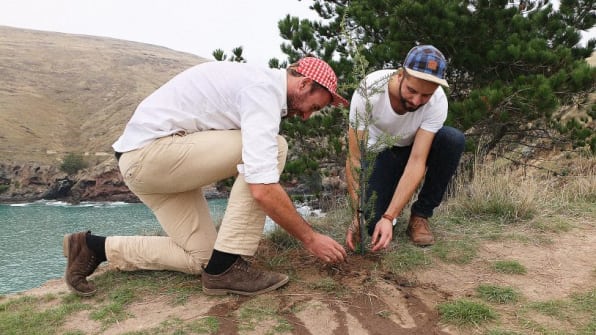The solar industry now provides more jobs than coal, and pays its workers better, but that didn’t stop Donald Trump from citing “job-killing regulations” among his reasons for signing an executive order to roll back President Barack Obama’s Clean Power Plan.
Most of the world howled in opposition, since the Clean Power Plan (like the Paris climate agreement) was designed to help save us all from dying on a polluted desert planet. But one group in New Zealand, at least, is taking immediate action–by encouraging the planting of new forests everywhere, and naming it after the climate change-denying leader of the free world.
Trump Forest, from sustainable hat company Offcut Caps founder Adrien Taylor and glaciologist Daniel Price, is a project designed to enable individuals and companies anywhere to pledge funds for reforestation (or afforestation, the planting of trees on bare land).

“We were just so frustrated and so angry to see what Trump did . . . that we felt like we had to do something about it,” Taylor tells Fast Company.
Trump Forest’s tagline is “where ignorance grows trees.” The original plan was to plant a tree for every time President Trump said the words “climate change,” but it quickly became apparent that this wouldn’t grow a forest: Trump has long refused to say the words, and, last week, the U.S. Department of Energy was barred from using the phrase “climate change,” along with “emissions reduction” and “Paris Agreement.”
Human civilization currently emits about 40 billion tons of carbon dioxide per year. To avoid extreme climate change, where the average global temperature would rise by 4°C, emissions need to be reduced to 22 gigatons (or 22 billion tons) by 2050.
Researchers at Oxford University estimate that, if pursued at scale, reforestation and afforestation could sequester as much as 5.5 billion tons of CO2 from the atmosphere per year. So while planting trees is not enough to reverse climate change, it is a low-cost and effective act of resistance when coupled with other climate action efforts.
Taylor, a New Zealand-based social entrepreneur who makes hats out of fabric that would otherwise end up in landfills, has paid about NZ$ 3,000 (about $ 2,100 American) to plant the first 1,000 trees. Those will soon take root along the Port Hills mountain range near Christchurch, where two raging fires scorched more than 2,000 hectares of land earlier this year.
“We’re working with the nonprofit Trees for Canterbury, which specializes in planting native trees throughout the Canterbury region of New Zealand and the South Island, as well as the local city council,” says Taylor.

“Port Hills is in a pretty bad way at the moment. It’s just recovering from the fire, obviously, so to ensure that the trees will grow strong and healthy, and to regenerate the wildlife that’s been lost there, we’ll have to wait to plant till later this year.”
Any individuals or companies interested in helping to grow the resistance in their neck of the woods can register to pledge trees at TrumpForest.com.
“We have no intention of making any money from this, or handling money in any way whatsoever,” says Taylor. “If you do make a pledge, we’ll link you to reputable local or international tree-planting [organizations]. You will make the donation directly to them.”
The Trump Forest team will, however, ask for a receipt for use in a visualization of its global forestry efforts, a virtual Trump Forest that lets you see all the trees planted in response to the U.S.’s new anti-climate attitude.
“The world’s most powerful man doesn’t accept basic climate science, and it’s incomprehensible that Trump is making decisions so harmful to the world at large, undoing much of the good progress that has been made with recent efforts,” says Taylor.
“I think the real and exciting part of this is that there’s an actual benefit growing from Trump’s stupidity.”
(69)